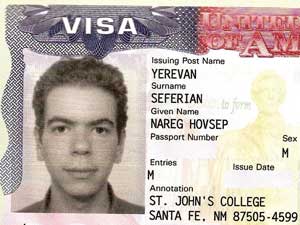Perhaps all international students discover at some point that going to college in the States costs more than they pay in money terms. I have experienced personal costs that will impact my life long after my education here is done. Some I was prepared to encounter, and others caught me off-guard. I don’t regret my decision to study in the States, but coming here has meant closing some doors and cutting off some possibilities.
As long as I can remember, mainstream political opinion in Russia has been anti-American, encouraged by the older generation who grew up in the Soviet Union and taught that America was an enemy to be opposed. Not everyone in the country is anti-American of course – in fact, most people I know are not actively anti-American – but there is an underlying suspicion of American values and intentions. As a result, my decision to study in America is viewed warily, and even negatively, by some.
Job prospects
I expect that, although my U.S. education will increase my job prospects in America and Europe, I will have difficulty finding someone to hire me in Russia with my credentials.
Many Russians believe that American education is not as rigorous as Russian education is, probably because they have heard that the academic environment in the U.S. is less formal and students there have “too much freedom” as they make their own course choices. Russian students don’t make many choices about their education. In my three years at a public Russian university, I wasn’t allowed to choose any classes.










 How I Made Myself a Good Candidate for US Admissions (and Other Advice from a Successful Applicant)
How I Made Myself a Good Candidate for US Admissions (and Other Advice from a Successful Applicant) Disability, Difference and Left-handedness in China and America
Disability, Difference and Left-handedness in China and America Why Aren't Americans and International Students Becoming Friends?
Why Aren't Americans and International Students Becoming Friends? Student Visa Tips From Visa Officers
Student Visa Tips From Visa Officers Top 5 Ways Academics in the US Are Different
Top 5 Ways Academics in the US Are Different Are You Competitive Enough to Make it in America?
Are You Competitive Enough to Make it in America? First Steps: What to Do if You Want to Study in the US
First Steps: What to Do if You Want to Study in the US The Truth: Americans Reveal What They Really Think of International Students
The Truth: Americans Reveal What They Really Think of International Students Staying Safe: A Story No One Should Have to Tell
Staying Safe: A Story No One Should Have to Tell What Does it Mean to "Be American" as a Chinese Student?
What Does it Mean to "Be American" as a Chinese Student? Don't Study in the US: A Look at the Pros and Cons
Don't Study in the US: A Look at the Pros and Cons How to Speak English Fluently?
How to Speak English Fluently?